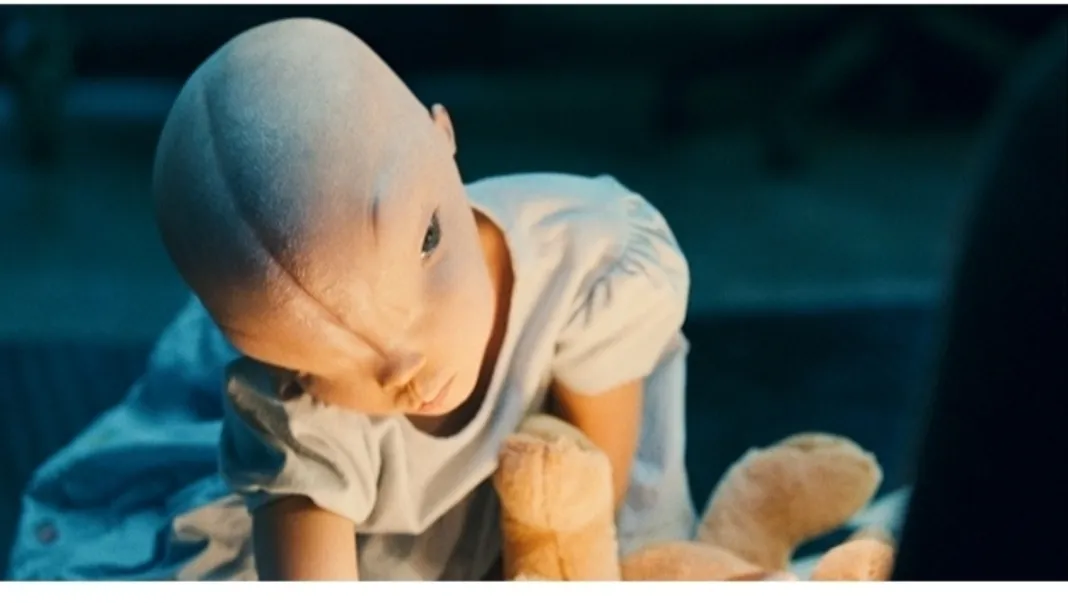Weird Science: Cinema’s Five Worst Experiments
Science fiction films, much more so than books, have always used audience’s fear of the unknown in order to sell tickets. Whatever can go wrong, will go wrong, in some exaggerated Hollywood context, especially when dealing with near-future technology. The film Splice is one of the latest of the techno-fear movies, playing on the long-time and still all-too-current phobia we seem to have of scientists who mess around in what some consider to be only God’s sandbox: genetics. The film tells the story of two lab rats (Adrian Brody and Sarah Polley) who secretly splice together a mish-mash of animal genes with human DNA and end up with a new creature they name “Dren”. As you might imagine, things don’t exactly end up sunshine and rainbows. But it’s hardly the first film to express society’s fears of the worst that could happen…
H.G. Wells original novel in 1896 was written as a reaction to public fears on animal vivisection and of degeneration, 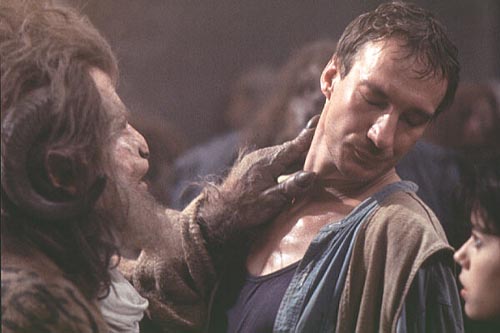 conjecture on Darwin’s Theory of Evolution that humans might not always be the dominant adapted species. It wasn’t until the third adaptation of the story into a film that the story’s root techno-fear became genetic tampering. John Frankenheimer helmed this version in 1996 starring Marlon Brando as the crazed doctor and Val Kilmer as the survivor of a plane crash who bears witness’s to the island’s mixture’s of human and animal DNA (including the perhaps uncomfortably sexy Fairuza Balk as a half-cat lady). The film was a gigantic mess and a failure both financially and critically, one which has been chalked up to a number of factors, but most notably, Frankenheimer directly attacking Kilmer and Brando as being totally impossible to work with. There’s an appeal though, so long after the fact the mess seems like more of a fascinating one.
conjecture on Darwin’s Theory of Evolution that humans might not always be the dominant adapted species. It wasn’t until the third adaptation of the story into a film that the story’s root techno-fear became genetic tampering. John Frankenheimer helmed this version in 1996 starring Marlon Brando as the crazed doctor and Val Kilmer as the survivor of a plane crash who bears witness’s to the island’s mixture’s of human and animal DNA (including the perhaps uncomfortably sexy Fairuza Balk as a half-cat lady). The film was a gigantic mess and a failure both financially and critically, one which has been chalked up to a number of factors, but most notably, Frankenheimer directly attacking Kilmer and Brando as being totally impossible to work with. There’s an appeal though, so long after the fact the mess seems like more of a fascinating one.
 When someone brought up cloning as a concept to the seventies, the decade lost it’s damn mind, no more memorably so than in the ’78 British/American co-production of Ira Levin’s novel of the worst possible post WWII nightmare. Some folks, even today, claim this actually happened (crazy people, mind you). I’m of course talking about, Hitler clones. Laurence Olivier hunts down Gregory Peck as Josepf Mengele who is trying to perform the heinous genetic recreation. Or has already….many times. Believe it or not, this fun but silly sci-fi film scored three Oscar nominations. And it’s even got a young Steve Guttenberg in it! Of course, in retrospect, many believe Guttenberg’s career itself to have been a third reich plot to instill mediocrity into the western world.
When someone brought up cloning as a concept to the seventies, the decade lost it’s damn mind, no more memorably so than in the ’78 British/American co-production of Ira Levin’s novel of the worst possible post WWII nightmare. Some folks, even today, claim this actually happened (crazy people, mind you). I’m of course talking about, Hitler clones. Laurence Olivier hunts down Gregory Peck as Josepf Mengele who is trying to perform the heinous genetic recreation. Or has already….many times. Believe it or not, this fun but silly sci-fi film scored three Oscar nominations. And it’s even got a young Steve Guttenberg in it! Of course, in retrospect, many believe Guttenberg’s career itself to have been a third reich plot to instill mediocrity into the western world.
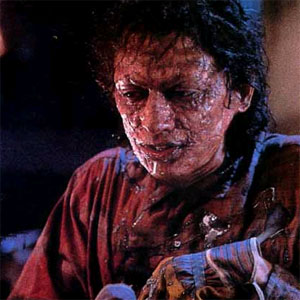
If you’ve seen David Cronenberg’s masterful 1986 remake of the 1958 film, then you’re going to be smacked in the face with thematic similarities when you watch Splice. There’s no getting past it: more than just a little influence came from this Jeff Goldblum starring horror film. He plays a scientist who has come up with an almost-functional teleportation chamber. When his new girlfriend (Geena Davis) gives him the idea of how to make it be able to transport things of the fleshy variety, he tries it out on himself, only to regret not having built in a more no-nonsense safety buffer. His DNA becomes fused with an errant fly who was in the machine with him, which at first seems great, as he is gifted with added strength and dexterity; if Stan Lee had come up with the idea first, it would be a superhero origin film. But it’s a Cronenberg film, which means horrible HORRIBLE mutations start happening and the worst/best (depending on your viewpoint) kind of get-under-your-skin body horror proceeds to turn things rather gooey.
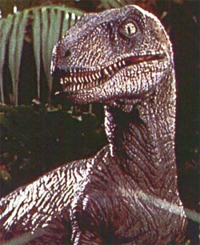 Isn’t science wonderful? Why, old man John Hammond (Richard Attenborough) is a modern day Walt Disney, taking the forefront of science and genetic engineering to do the most wonderful thing imaginable: bringing back to life the dinosaurs! At least on paper perhaps it sounded great, but as Sam Neill, Laura Dern, Jeff Goldblum and others discover, not so much in practice. “Nature always finds a way”, Goldblum’s chaos theory scientist opines, and of course, he nails it on the head as the genetic solution Hammond’s scientists came up with to fill in sequence gaps, leads to the uncontrolled breeding that is the worst case scenario for the island. Audiences and critics largely embraced the film, many reacting with the same sort of sense of wonder the characters in it expressed (at first) at the dinosaurs in it, the effects being game-changing at the time. It was popular enough for it to garner two not-as-successful sequels and I think everyone fully expects the long-planned fourth movie to eventually rear it’s potentially ugly head.
Isn’t science wonderful? Why, old man John Hammond (Richard Attenborough) is a modern day Walt Disney, taking the forefront of science and genetic engineering to do the most wonderful thing imaginable: bringing back to life the dinosaurs! At least on paper perhaps it sounded great, but as Sam Neill, Laura Dern, Jeff Goldblum and others discover, not so much in practice. “Nature always finds a way”, Goldblum’s chaos theory scientist opines, and of course, he nails it on the head as the genetic solution Hammond’s scientists came up with to fill in sequence gaps, leads to the uncontrolled breeding that is the worst case scenario for the island. Audiences and critics largely embraced the film, many reacting with the same sort of sense of wonder the characters in it expressed (at first) at the dinosaurs in it, the effects being game-changing at the time. It was popular enough for it to garner two not-as-successful sequels and I think everyone fully expects the long-planned fourth movie to eventually rear it’s potentially ugly head.
As obvious a good thing as it would seem to many, the idea of using genetic 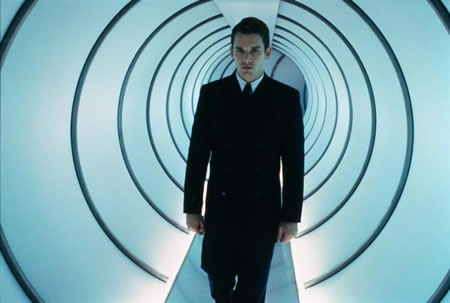 technology to protect the human genome from abnormalities, there certainly would be a possible dark side to it, one which this 1997 sci-fi film explores. Ethan Hawke plays a man born without the use of this tech and finds himself in a society that, regardless of genetic discrimination laws, doesn’t allow “In-Valid”s such as himself to do much. When he meets Jude Law, a former athlete who was paralyzed in a suicide attempt, he buys his DNA identity in order to pursue his own dream of becoming an astronaut. Of course, there’s no problem with that genetic resume to get the job, but shortly before launch, a man is murdered and some of that borrowed DNA is found on the crime scene. Hawke has to dodge the detective (Alan Arkin) and hope that not only he is cleared of the crime, but that no one discovers his deception and that his new girlfriend (Uma Thurman) doesn’t react as most women have since the beginning of time to the genetically insufficient. Of all the films about such things, Gattaca has the greatest feel of ‘it could happen’ and it has garnered a respectable cult following since it’s release. Even though it wasn’t a smash theatrically, over ten years later there’s now a television show adaptation in the works. Some sci-fi seems more prescient than most; all we can do is hope that Gattaca isn’t one of them.
technology to protect the human genome from abnormalities, there certainly would be a possible dark side to it, one which this 1997 sci-fi film explores. Ethan Hawke plays a man born without the use of this tech and finds himself in a society that, regardless of genetic discrimination laws, doesn’t allow “In-Valid”s such as himself to do much. When he meets Jude Law, a former athlete who was paralyzed in a suicide attempt, he buys his DNA identity in order to pursue his own dream of becoming an astronaut. Of course, there’s no problem with that genetic resume to get the job, but shortly before launch, a man is murdered and some of that borrowed DNA is found on the crime scene. Hawke has to dodge the detective (Alan Arkin) and hope that not only he is cleared of the crime, but that no one discovers his deception and that his new girlfriend (Uma Thurman) doesn’t react as most women have since the beginning of time to the genetically insufficient. Of all the films about such things, Gattaca has the greatest feel of ‘it could happen’ and it has garnered a respectable cult following since it’s release. Even though it wasn’t a smash theatrically, over ten years later there’s now a television show adaptation in the works. Some sci-fi seems more prescient than most; all we can do is hope that Gattaca isn’t one of them.


